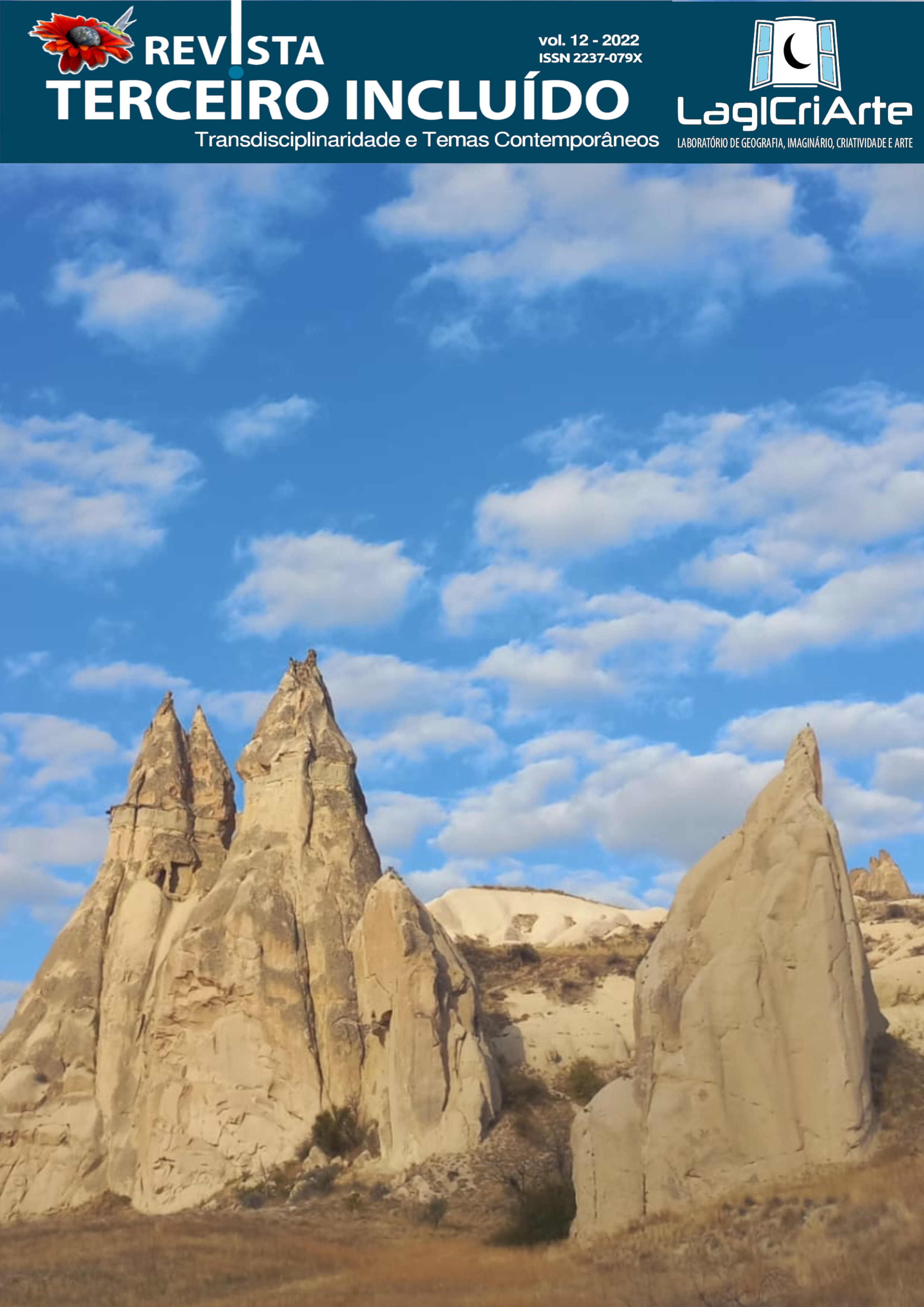INTERDISCIPLINARITY, POLITICAL ECOLOGY AND TRADITIONAL COMMUNITIES IN LATIN AMERICA
DOI:
https://doi.org/10.5216/teri.v12i1.74785Keywords:
Dialogue of knowledge, Interdisciplinarity, Latin American epistemologies, Political Ecology, Traditional peoples and communitiesAbstract
Latin America is a historically dispossessed region, within the constitution of the world system, and excluded, in relation to the social thought it produced. However, it is one of the regions with the greatest biodiversity and cultural diversity in the world, elements constantly threatened and put into dispute between peoples and hegemonic interests of the processes of capitalist modernity. Thus, we intend to discuss the relevance of interdisciplinarity, complexity and Political Ecology in studies involving traditional peoples and communities and the environmental issue in Latin America. For this, we follow an approach that transits between traditional and scientific knowledge and that is capable of providing aspects for understanding the so-called environmental crisis, whose peoples and traditional communities are subjects that have the potential to mitigate it, as they adopt productive systems less predatory. The methodology, with a qualitative approach, was a review and bibliographical analysis in which some classic authors on the subject were used, giving preference to Latin American authors, in order to use approaches from Latin American critical epistemologies and from the field of Political Ecology.
Downloads
References
BORON, Atílio. Notas sobre a atualidade do imperialismo e a nova estratégia de segurança nacional dos Estados Unidos. In: LÓPEZ, Emiliano (org.). As veias do Sul continuam abertas: debates sobre o imperialismo em nosso tempo. São Paulo: Expressão Popular, 2020. p. 95-140.
BRASIL. Constituição da República Federativa do Brasil. Brasília-DF: Senado Federal, 1988.
BRASIL. Decreto nº6040 de 2007. Institui a Política Nacional de Desenvolvimento Sustentável dos povos e comunidades tradicionais. Disponível em: <http://www.planalto.gov.br/ccivil_03/_ato2007-2010/2007/decreto/d6040.htm>. Acesso em 14/07/2019.
CASTRO-GOMÉZ. Ciencias sociales, violencia epistémica y el problema de la “invención del otro. In.: LANDER, Edgardo (org.). La colonialidad del saber: eurocentrismo y ciencias sociales. Buenos Aires: Consejo Latinoamericano de Ciencias Sociales, 2000. p.145-162. Disponível em: <https://www.tni.org/files/download/La%20colonialidad%20del%20saber.%20Eurocentrismo%20y%20ciencias%20sociales.pdf>. Acesso em: 05/07/2019.
CASTRO, Josué de. Subdesenvolvimento: causa primeira da poluição. In: FERNANDES, Bernardo Mançano; PORTO GONÇALVES, Carlos Walter (orgs.). Josué de Castro: vida e obra. 2 ed. São Paulo: Expressão Popular, 2007. p. 165-173.
DIEGUES, Antonio Carlos Sant’Anna. Conhecimento, práticas tradicionais e a etnoconservação da natureza. Desenvolvimento e meio ambiente, v.50, p.116-126, 2019. Disponível em: <https://revistas.ufpr.br/made/article/view/66617/38436>. Acesso em: 20/07/2019.
DIEGUES, Antonio Carlos Sant’Anna. Ecologia humana e planejamento costeiro. 2. ed. São Paulo: NUPAUP/USP, 2001.
ESCOBAR, Arturo. Territorios de la diferencia: Lugar, movimientos, vida, redes. 2.ed. Popayan: Universidad del Cauca. Sello Editorial, 2015.
ESCOBAR, Arturo. El lugar de la naturaleza y la naturaleza del lugar. In: LANDER, Edgardo (org.). La colonialidad del saber: eurocentrismo y ciencias sociales. Buenos Aires: Consejo Latinoamericano de Ciencias Sociales, 2000. p.113-144.
ESCOBAR, Arturo. Power and visibility: Development and the invention and Management of the Third World. Cultural Anthropology, v.3, n.4, p.428-443, 1988. Disponível em: <https://pdfs.semanticscholar.org/b3e0/86370f91d77ac0e1a3e5d5509f4b681c15de.pdf>. Acesso em: 05/07/2019.
GOMÉZ POMPA, Arturo. KAUS, Andrea. Domesticando o Mito da Natureza Selvagem. In: DIEGUES, A. C. S. (org.) Etnoconservação: novos rumos para a conservação da natureza. São Paulo: Hucitec/Annablume/Nupaub-USP, 2000. p. 125-148.
LANDER, Edgardo. Ciencias sociales: saberes coloniales y eurocéntricos. In: LANDER, Edgardo (org.). La colonialidad del saber: eurocentrismo y ciencias sociales. Buenos Aires: Consejo Latinoamericano de Ciencias Sociales, 2000. p.11-40.
LEFF, Enrique. Political Ecology: a Latin American Perspective. Desenvolvimento e Meio Ambiente, v. 35, p. 29-64, 2015. Disponível em: <https://revistas.ufpr.br/made/article/view/44381>. Acesso em: 05/07/2020.
LEFF, Enrique. Complexidade, interdisciplinaridade e saber ambiental. Olhar do professor, v. 14, n.2, p. 309-335, 2011. Disponível em: <http://www.revistas2.uepg.br/index.php/olhardeprofessor/article/view/3515>. Acesso em: 22/06/2019.
LEFF, Enrique. Complexidade, Racionalidade Ambiental e Diálogo de Saberes. Educação e Realidade, v.34, n.3, p.17-24, 2009a. Disponível em: <https://seer.ufrgs.br/educacaoerealidade/article/view/9515>. Acesso em: 24/06/2019.
LEFF, Enrique. Ecologia, capital e cultura: a territorialização da racionalidade ambiental. Petrópolis: Vozes, 2009b.
LITTLE, Paul Elliott. Ecologia Política como etnografia: um guia teórico metodológico. Horizontes Antropológicos, a. 12, n. 25, p. 85-103, 2006. Disponível em: <http://www.scielo.br/scielo.php?script=sci_arttext&pid=S0104-71832006000100005>. Acesso em: 20/04/2019.
LIU, Jianguo; DIETZ, Thomas; CARPENTER, Stephen; ALBERTI, Marina; FOLKE, Carl; MORAN, Emilio; PELL, Alice; DEADMAN, Peter; KRATZ, Timothy; LUBCHENCO, Jane; OSTROM, Elinor; OUYANG, Shiyun; PROVENCHER, Willian; REDMAN, Charles; SCHNEIDER, Stephen; TAYLOR, Willian. Complexity of Human and Natural Systems. Science Magazine, v. 317, n. 14, p. 1513 - 1516, 2007. Disponível em: <https://science.sciencemag.org/content/317/5844/1513/tab-pdf>. Acesso em: 28/06/2019.
MARIÁTEGUI, José Carlos. 7 ensayos de interpretación de la realidad peruana. 3.ed. Caracas: Fundación Biblioteca Ayaucho, 2007. Disponível em: <http://resistir.info/livros/mariategui_7_ensayos.pdf>. Acesso em: 31/07/2019.
MIGNOLO, Walter. La colonialidad a lo largo y a lo ancho: el hemisferio occidental en el horizonte colonial de la modernidad. In: LANDER, Edgardo (org.). La colonialidad del saber: eurocentrismo y ciencias sociales. Buenos Aires: Consejo Latinoamericano de Ciencias Sociales, 2000. p. 55-86.
MORAN, Emilio. Meio Ambiente e Ciências Sociais: interações homem - ambiente e sustentabilidade. São Paulo: Senac, 2011.
MORIN, Edgar. A cabeça bem feita: repensar a reforma, reformar o pensamento. 20.ed. Rio de Janeiro: Bertrand Brasil, 2012.
PORTO GONÇALVES, Carlos Walter. A ecologia política na América Latina: reapropriação social da natureza e reinvenção dos territórios. Revista INTERthesis, v.9, n.1, p. 16-50, 2012. Disponível em: <https://periodicos.ufsc.br/index.php/interthesis/article/view/1807-1384.2012v9n1p16>. Acesso em: 21/02/2021.
PORTO GONÇALVES, Carlos Walter; LEFF, Enrique. Political Ecology in Latin America: the Social Re-Appropriation of Nature, the Reinvention of Territories and the Construction of an Environmental Rationality. Desenvolvimento e Meio Ambiente, v. 35, p. 65-88, 2015. Disponível em: < https://revistas.ufpr.br/made/article/view/43543>. Acesso em: 03/07/2020.
PORTO GONÇALVES, Carlos Walter; QUENTAL, Pedro de Araújo. Colonialidade do poder e os desafios da integração regional na América Latina. Polis: revista latinoamericana, v.11, n.31, p. 295-332, 2012. Disponível em: <https://polis.revues.org/3749>. Acesso em: 23/08/2017.
QUIJANO, Aníbal. Dom Quixote e os moinhos de vento na América Latina. Revista de estudos avançados, v.19, n.55, p. 9-31, 2005.
QUIJANO, Aníbal. Colonialidad del poder, eurocentrismo y América Latina. In: LANDER, Edgar (org.). La colonialidad del saber: eurocentrismo y ciencias sociales. Buenos Aires: Consejo Latinoamericano de Ciencias Sociales, 2000. p.201 -246.
Downloads
Published
How to Cite
Issue
Section
License
Copyright (c) 2022 Júlio César Suzuki, Dorival Bonfá Neto

This work is licensed under a Creative Commons Attribution-ShareAlike 4.0 International License.











